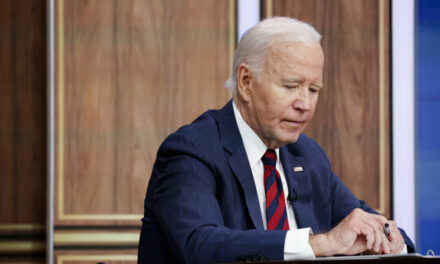We support our Publishers and Content Creators. You can view this story on their website by CLICKING HERE.
U.S. Senate candidates Kirsten Gillibrand and Mike Sapraicone and U.S. House contenders Nick LaLota and John Avlon clash on a range of issues.
As Nov. 5 draws near, candidates in two of New York state’s most closely watched races got their final chance to debate their opponents and set forth an agenda for 2025 and beyond.
Incumbent U.S. Sen. Kirsten Gillibrand (D-N.Y.) debated Republican challenger Mike Sapraicone, a former New York City homicide detective, while incumbent U.S. Rep. Nick LaLota (R-N.Y.) took the stage to spar with Democratic challenger John Avlon, a onetime speechwriter for former Mayor Rudy Giuliani.
In the Gillibrand–Sapraicone debate, each candidate got 60 seconds to respond to a question from the moderators and a shorter amount of time to rebut his or her opponent.
The candidates began by addressing polls that point to a high level of pessimism among New York’s voters about the state of their economy and the quality of their lives.
Acknowledging the frustration that many voters feel in a state where “the economy is not working the same for everyone,” Gillibrand claimed to have made progress toward bringing down living costs, including capping insulin costs at $35 per month and locking in the lowest costs for the top 10 drugs that senior citizens take. She also touted an aggressive campaign of infrastructure refurbishment, with significant investments in roads, sewers, bridges, and airports, and she said that semiconductor manufacturing will soon play a far more prominent role in the economy of the Syracuse region and other parts of the state.
Gillibrand also alluded to an issue that has come up in many congressional campaigns, namely, the State and Local Tax (SALT) deduction.
“We also need to lower their taxes. Unfortunately, President [Donald] Trump, whom my opponent supports, got rid of the SALT deduction for no reason. It harmed New Yorkers. It harmed blue states. So we need to restore that deduction,” she said.
Sapraicone responded that illegal immigration and the related issue of crime have given many voters a gloomy outlook.
“I tie them together as a domino effect. And look at the poor economics that we have. When you go to Thanksgiving dinner this year, you’re going to pay about four times more than you paid last year or the year before, and this is ongoing,” he said.
He alluded to what he sees as a lopsided relationship between upstate and downstate New York, marked by an unfair misallocation of resources that prioritizes the needs of illegal immigrants over those of veterans and vulnerable residents.
“We’re sending over $5 billion from upstate New York down to the city, to give debit cards to illegal immigrants, to support them and get them more education and more food and more health care,” said Sapraicone.
Sapraicone advocated boosting businesses, and small ones in particular, as a means of bringing down inflation over time. This will alleviate the blight and shuttered storefronts that some visitors to upstate New York encounter, he said.
His stance went beyond supporting small businesses. In Sapraicone’s view, it was a mistake for New York not to welcome Amazon to the state, a move that would have brought 20,000 jobs.
Gillibrand argued that high interest rates had driven up rents and the costs that homebuyers face and said that the COVID-19 pandemic had a crippling effect on supply chains. She criticized cereal makers and other food producers for selling smaller portions for the same prices as before out of greed.
“It’s just corporations being greedy, and taking advantage of what happened before COVID, during COVID, and after COVID to keep making the big bucks,” she said.
Gillibrand argued for a national paid leave plan so that people with a new baby in their lives, or a sick and dying parent, will not suffer crippling economic consequences. She blamed Republicans “who don’t believe that rewarding work is part of American values.”
On the question of Proposition 1, the controversial “Equal Rights Amendment” that would expand the categories protected under state antidiscrimination law to include pregnant women and women who have recently given birth, Gillibrand said emphatically that she would vote yes and urged voters to do so.
“We deserve bodily autonomy, we deserve the right to make decisions about when we’re having children and under what circumstances we’re having children,” she said.
Sapraicone said he would vote no on Proposition 1, arguing that it is not fundamentally about abortion, that New York has already had one of the most permissive abortion laws in the country for more than 50 years, and that the proposition would, in effect, allow an 8-year-old to decide whether he or she is male or female and would take parents out of critical decisions about a child’s well-being.
“You’re absolutely wrong. Equal rights amendments have been used in the law, across this country, to guarantee reproductive rights,” Gillibrand said.
When Sapraicone insisted that the proposal would allow men to enter women’s locker rooms and to compete with them in sports, Gillibrand said that “less than a handful” of such incidents were on record as having occurred in New York state and that her opponent was using a “red herring” to “demonize” the most vulnerable children in the state.
The candidates also clashed on illegal immigration. Sapraicone said that mass deportation is not realistic, but called for removing criminals from American streets. For her part, Gillibrand acknowledged the need for comprehensive immigration reform and praised Gov. Kathy Hochul’s efforts to make emergency visas more widely available for immigrants who seek work in the state’s hotels, restaurants, farms, and hospitals.
Sen. Kirsten Gillibrand (D-N.Y.) tells NTD’s Chris Bob her hope for America. Screenshot via NTD
Debating Long Island’s Economy
In New York District 1’s U.S. House debate, LaLota and Avlon highlighted their contrasting backgrounds. LaLota spoke proudly of his and his relatives’ longstanding service in the police and military, while Avlon described himself as not a “professional, partisan politician” but “a journalist and historian.”
According to Avlon, housing prices have placed the biggest strain on middle-class families trying to get by on Long Island. The price of housing has risen by 87 percent over the last decade, while only 2 percent more housing has come onto the market, he said.
Avlon called for modifying a bill currently before Congress, the Helpers Act, so that it extends housing aid not just to police and firefighters, as currently written, but also to teachers and nurses.
“Too often, those essential workers are not able to live in or near the communities they serve. That compounds the traffic problem,” he said.
Avlon called for expanding the child tax credit, to offer $6,600 for families with small children.
LaLota described “big government intervention” in the housing market on Long Island as “the Hochul approach,” taking critical decisions out of the hands of local business owners.
At present, business owners in New York’s First District struggle under what LaLota called the highest sales property income taxes in the nation.
“Since one-party rule in Albany in 2018, the cost of everything has gone up, especially real estate and taxes and everything associated with it. It’s the reason so many people are leaving Long Island for what they view as greener pastures in Florida and the Carolinas,” he said.
The candidates also sparred over the SALT deduction. LaLota criticized the 14 New York Democrats in the House of Representatives for voting along party lines with other Democrats to block a higher cap on the deduction when the matter came to a vote in February.

 Conservative
Conservative  Search
Search Trending
Trending Current News
Current News 







